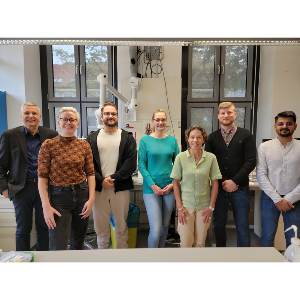Dietrich Lab
Identification of pharmacological target structures in pathophysiological mechanisms

Identification of pharmacological target structures in pathophysiological mechanisms

In our research group for Experimental Pharmacotherapy we focus on the identification of pharmacological targets in pathophysiological mechanisms. In the future, we would like to activate or inhibit these targets in animal models and in patients. We are using gene-deficient or knock-out mouse models with deleted genes of interest to understand physiological and pathophysiological functions of different target proteins in the organism.
Ion channels are important drug targets. Therefore, we analyze functions of „transient receptor potential“ (TRP) channels for the development of diseases in the lung (1, 2) (Fig.: 1).
As a member of the German Lung Center (DZL) and with financial support by the Deutsche Forschungsgemeinschaft (DFG) (Transregional Collaborative Research Centre 152, Research Training Group) we were able to detect numerous roles for TRP channels in the lung. In primary murine lung fibroblasts TRPC6 is up-regulated after lung injury or application of the cytokine “transforming growth factor beta (TGF-β)” and supports myofibroblast differentiation as well as the development of lung fibrosis (3), while TRPA1 channels inhibit transition of human fibroblasts to myofibroblasts (4). Moreover, we were able to identify an essential role of TRPC6 for acute hypoxic pulmonary vasoconstriction (aHPV) (5). Most interestingly, TRPC6-deficient mice lacking aHPV showed severe arterial hypoxemia after blockage of parts of the lung. In the future, TRPC6 activators may present important therapeutic agents for patients with lung sepsis, pneumonia or systemic inflammation to avoid arterial hypoxemia.
Next to smooth muscle cells, endothelial cells are essential for pulmonary gas exchange. We were able to show that TRPC6-deficient lungs are protected from ischemia-reperfusion injury (IRI). Lung IRI might occur if lungs are not perfused during transportation. We demonstrate that TRPC6-induced decreases in lung endothelial permeability are essential for IRI and are suppressed by TRPC6 deficiency (6). Most interestingly, a specific blockage of TRPC6 by an inhibitor provided by Prof. Michael Schaefer’s lab, University of Leipzig, was able to reduce IRI (7) and might protect isolated lungs intended for transplantation in the future.
Another TRP channel (TRPV4) is expressed in the alveolar epithelium (Fig. 2) and involved in the production of surfactant protein for protection and increased oxygen uptake. After ablation of TRPV4 channels in these cells, aged mice develop emphysema-like changes, which - in clear contrast to TRPC6 - increase ischemia-reperfusion-induced edema formation (8).
Therefore, our data suggest that TRP modulators may be used as therapeutic options in patients with hypertension, lung edema or lung fibrosis.
Please do not hesitate to contact our lab by email (alexander.dietrich@lrz.uni-muenchen.de), if you are interested in these projects.

Professorship for Experimental Pharmacotherapy
| Name | Tel | Room | Position | |
|---|---|---|---|---|
| Alt, Philipp | philipp.alt@lrz.uni-muenchen.de | +49 89 2180 73813 | A00.060 | Doctoral student |
| Kiefmann, Martina | martina.kiefmann@lmu.de | +49 89 2180 73813 | A00.060 | Postdoc |
| Kirmayer, Benedikt | b.kirmayer@lmu.de | +49 89 2180 73813 | A00.060 | CTA |
| Müller, Isabel | isabel.mueller@lrz.uni-muenchen.de | +49 89 2180 73813 | A00.060 | Doctoral student |
| Schaller, Lena | Lena.Schaller@lmu.de | +49 89 2180 73813 | A00.060 | Doctoral student |
| Singh, Randhwaj Pratap | R.Singh@lmu.de | +49 89 2180 73813 | A00.060 | Docctoral student |
1. Dietrich, A. (2019) Modulators of Transient Receptor Potential (TRP) Channels as Therapeutic Options in Lung Disease. Pharmaceuticals 12:23. DOI: 10.3390/ph12010023.
2. Müller, I., Alt, P., Rajan, S., Schaller, L., Geiger, F., Dietrich, A. (2022). Transient Receptor Potential (TRP) Channels in Airway Toxicity and Disease: An Update. Cells 11:2907. DOI: 10.3390/cells11182907.
3. Hofmann, K., Fiedler, S., Vierkotten, S., Weber, J., Klee, S., Jia, J., Zwickenpflug, W., Flockerzi, V., Storch, U., Yildirim, A.Ö., Gudermann, T., Königshoff, M., Dietrich, A. (2017). Classical transient receptor potential (TRPC6) channels support myofibroblast differentiation and development of experimental pulmonary fibrosis. Biochem Biophys Acta 1863: 560-568. DOI: 10.1016/j.bbadis.2016.12.002
4. Geiger, F., Zeitlmayr; S., Staab-Weijnitz, C.A., Rajan, S., Breit, A., Gudermann, T., Dietrich, A. (2023). An Inhibitory Function of TRPA1 Channels in TGF-β1-driven Fibroblast to Myofibroblast Differentiation. Am. J. Resp. Cell. Mol. Biol. 68: 314. DOI: 10.1165/rcmb.2022-0159OC
5. Weissmann*, N., Dietrich*, A., Fuchs, B., Kalwa, H., Ay, M., Dumitrascu, R., Olschewski, A., Mederos y Schnitzler, M., Ghofrani, H.A., Schermuly, R.T., Pinkenburg, O., Seeger, W., Grimminger, F. and Gudermann, T. (2006). Classical transient receptor potential channel 6 (TRPC6) is essential for hypoxic pulmonary vasoconstriction and alveolar gas exchange. Proc. Natl. Acad. Sci. U.S.A. 103, 19093. DOI:10.1073/pnas.0606728103. *equal contributing and corresponding authors.
6. Weissmann, N., Sydykov, A., Kalwa, H., Storch, U., Fuchs, B., Mederos y Schnitzler, M., Brandes, R.P., Grimminger, F., Meissner, M., Freichel, M., Offermanns, S., Veit, F., Pak, O., Krause, K.-H., Schermuly, R.T., Brewer, A.C., Schmidt, H.H.H.W., Seeger, W., Shah, A.M., Gudermann, T., Ghofrani, H.A. & Dietrich, A. (2012). Activation of TRPC6 channels is essential for ischemia–reperfusion-induced lung edema in mice. Nat. Commun. 3: 649. DOI: 10.1038/ncomms1660.
7. Häfner, S., Burg, F., Kannler, M., Urban, N., Mayer, P., Dietrich, A., Trauner, D., Broichhagen, J., Schaefer. M. (2018). A (+)-Larixol Congener with High Affinity and Subtype Selectivity toward TRPC6. ChemMedChem 13:1028. Doi: 10.1002/cmdc.201800021.
8. Weber, J., Rajan, S., Schremmer, C., Chao, Y.K., Krasteva-Christ, G., Kannler, M., Yildirim, A.Ö., Brosien, M., Schredelseker, J., Weissmann, N., Grimm, C., Gudermann, T., Dietrich, A. (2020). TRPV4 channels are essential for alveolar epithelial barrier function as protection from lung edema. JCI Insight 5:e134464. doi: 10.1172/jci.insight.134464.
Alle Literaturangaben zu finden unter PubMed.